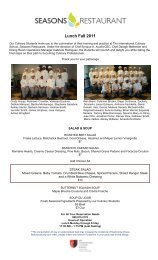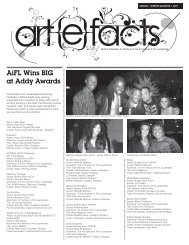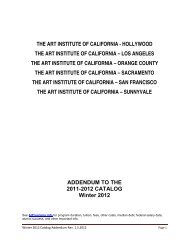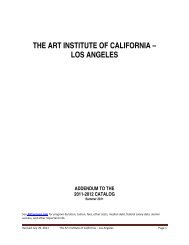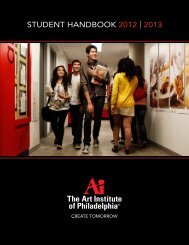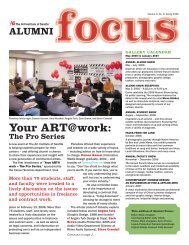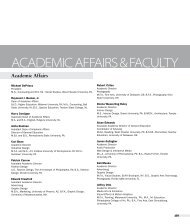2009 - 2010 Catalog - The Art Institutes
2009 - 2010 Catalog - The Art Institutes
2009 - 2010 Catalog - The Art Institutes
Create successful ePaper yourself
Turn your PDF publications into a flip-book with our unique Google optimized e-Paper software.
• Students should provide<br />
documentation to support the<br />
allegations of the appeal.<br />
• <strong>The</strong> President or his/her delegate<br />
may appoint an ad hoc committee<br />
to review appeals and make<br />
a recommendation regarding<br />
disposition of the appeal within 30<br />
days of the date of receipt of the<br />
appeal. This committee will be<br />
comprised of faculty or staff members<br />
not involved in making the initial<br />
disciplinary decision.<br />
• <strong>The</strong> President and/or the committee<br />
may decide to convene an appeal<br />
hearing. <strong>The</strong> student will be notified<br />
in writing of the date and time of the<br />
appeal. <strong>The</strong> student is expected to<br />
attend the meeting, and failure to<br />
do so, for other than documented<br />
emergencies, may be considered<br />
forfeiture of the right to present<br />
further information regarding the<br />
appeal.<br />
• <strong>The</strong> student making the appeal<br />
may be provided an opportunity to<br />
address the committee in person. <strong>The</strong><br />
student may be accompanied by one<br />
person (family member, friend, etc)<br />
as an observer. <strong>The</strong> committee may<br />
prohibit from attending or remove any<br />
person who disrupts the proceedings<br />
of the committee.<br />
• <strong>The</strong> Appeal Committee is an<br />
academic hearing, not a legal hearing.<br />
<strong>The</strong>refore, legal counsel is not<br />
allowed at the meeting.<br />
• Audio recording of the academic<br />
hearing is not permitted. Minutes of<br />
the meeting are confidential.<br />
• Following appropriate review and<br />
deliberation, the committee will<br />
report back to the President or his/<br />
her delegate with its recommendation<br />
following its review of the appeal.<br />
<strong>The</strong> President or his/her delegate<br />
will render a written decision on the<br />
appeal within thirty calendar days<br />
from receipt of the appeal. <strong>The</strong><br />
decision will be final.<br />
For more information about Student Affairs<br />
and its policies, visit http://www.artinstitutes.edu/minneapolis/StudentLife/.<br />
NO HARASSMENT POLICY<br />
<strong>The</strong> <strong>Art</strong> <strong>Institutes</strong> International Minnesota<br />
is committed to providing workplaces and<br />
learning environments that are free from<br />
harassment on the basis of any protected<br />
100<br />
classification including, but not limited to<br />
race, sex, gender, color, religion, sexual<br />
orientation, age, national origin, disability,<br />
medical condition, marital status, veteran<br />
status or on any other basis protected<br />
by law. Such conduct is unprofessional,<br />
unproductive, illegal, and generally considered<br />
bad for business. Consequently,<br />
all conduct of this nature is expressly<br />
prohibited, regardless of whether it violates<br />
any law.<br />
I. DEFINITION OF SEXUAL<br />
HARASSMENT<br />
Sexual harassment consists of unwelcome<br />
sexual advances, requests for sexual<br />
favors, or other verbal or physical conduct<br />
of a sexual nature where:<br />
a. Submission to such conduct is an<br />
explicit or implicit term or condition<br />
of a person’s status in a course,<br />
program, activity, or in admission, or<br />
in an academic decision.<br />
b. Submission to or rejection of such<br />
conduct is used as a basis for an<br />
academic decision; or<br />
c. Such conduct has the purpose or<br />
effect of unreasonably interfering<br />
with an individual’s work or academic<br />
performance or creating an intimidating,<br />
hostile, or offensive work or<br />
educational environment.<br />
Examples of sexual harassment include,<br />
but are not limited to: unwanted sexual<br />
advances; demands for sexual favors in<br />
exchange for favorable treatment; verbal<br />
abuse of a sexual nature; graphic commentary<br />
about an individual’s body, sexual<br />
prowess, or sexual deficiencies; leering;<br />
whistling; touching; pinching; assault;<br />
coerced sexual acts; suggestive, insulting<br />
or obscene comments or gestures; stalking;<br />
and displaying sexually suggestible<br />
objects or pictures. <strong>The</strong> <strong>Art</strong> <strong>Institutes</strong> International<br />
Minnesota prohibits all conduct<br />
of this nature whether or not such conduct<br />
violates any applicable laws.<br />
II. OTHER FORMS OF HARASSMENT<br />
Verbal abuse, insulting comments and<br />
gestures, and other harassing conduct<br />
are also forbidden under this policy when<br />
directed at an individual because of his<br />
or her race, color, sex, sexual orientation,<br />
familial status, age, religion, ethnic origin,<br />
or disability. It is the responsibility of each<br />
employee and each student to conduct<br />
himself or herself in a professional manner<br />
at all times and to refrain from such<br />
harassment.<br />
III. COMPLAINT PROCEDURE<br />
Students who feel they have been harassed<br />
should follow the Student Grievance<br />
Procedure for Internal Complaints of<br />
Harassment and Discrimination located<br />
in the Student Handbook. Promptly after<br />
learning of such alleged conduct, <strong>The</strong><br />
<strong>Art</strong> <strong>Institutes</strong> International Minnesota will<br />
conduct an investigation for the purpose of<br />
determining whether prohibited harassment<br />
has occurred. Efforts will be made<br />
to ensure confidentiality to the extent<br />
consistent with the goal of conducting an<br />
appropriate investigation. Students who<br />
initiate or participate in such investigations<br />
in good faith will be protected<br />
against school-related retaliation. If an<br />
investigation confirms the allegations, <strong>The</strong><br />
<strong>Art</strong> <strong>Institutes</strong> International Minnesota will<br />
take prompt corrective action, which may<br />
include discipline, up to and including immediate<br />
dismissal.<br />
FAMILY EDUCATIONAL RIGHTS<br />
AND PRIVACY ACT<br />
<strong>The</strong> Family Educational Rights and Privacy<br />
Act of 1974, as amended (“FERPA”) sets<br />
out requirements designed to afford<br />
students certain rights with respect to their<br />
education records. In addition, it puts limits<br />
on what information <strong>The</strong> <strong>Art</strong> <strong>Institutes</strong><br />
International Minnesota may disclose to<br />
third parties without receiving prior written<br />
consent from the student.<br />
I. PROCEDURE TO INSPECT<br />
EDUCATIONAL RECORDS:<br />
Students have the right under FERPA<br />
to inspect and review their education<br />
records. A student who wishes to inspect<br />
and review his/her records should submit<br />
a written request to the Registrar. <strong>The</strong><br />
request should identify as precisely as<br />
possible the records the student wishes<br />
to inspect. If the requested records are<br />
subject to inspection and review by the<br />
student, arrangements for access will be<br />
made within a reasonable period of time<br />
but in no case more than 45 days after the<br />
request was made, and the student will be<br />
notified of the time and place where the<br />
records may be inspected. <strong>The</strong> school<br />
may require the presence of a school official<br />
during the inspection and review of a<br />
student’s records.<br />
Certain limitations exist on a student’s right<br />
to inspect and review their own education<br />
records. Those limitations include, for<br />
example, the following:<br />
i. financial information submitted<br />
by parents;<br />
ii. confidential letters and<br />
recommendations placed in their<br />
files prior to January 1, 1975;<br />
iii. confidential letters and<br />
recommendations placed in<br />
their files after January 1, 1975



